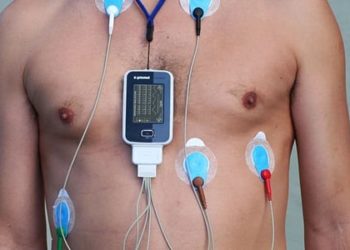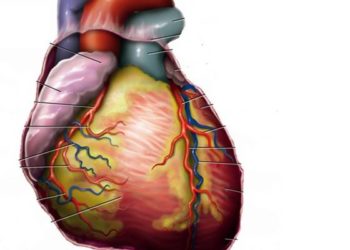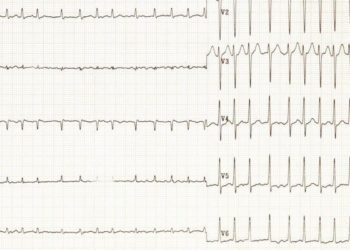Active EKG monitoring screening leads to earlier diagnosis and treatment for atrial fibrillation compared to delayed monitoring
1. In this randomized controlled trial, patients who received immediate atrial fibrillation (AF) monitoring with a new, wearable EKG were more likely to have their AF diagnosed compared to the delayed monitoring group.
2.Participants in the active monitoring group had a higher rate of initiation of anticoagulant therapy specifically for AF compared to the delayed monitoring group.
Evidence Rating: 1 (Excellent)
Study Rundown: AF is one of the most common arrhythmias, and early diagnosis and treatment leads to a reduction in strokes and mortality. For episodic AF, detection of the arrhythmia can be challenging and new solutions for constant monitoring may increase AF detection and improve outcomes. In this randomized controlled trial, participants were either actively screened for AF using a novel, home-based, continuous EKG monitoring patch or went through delayed screening four months later. During a subsequent observational period, those randomized to wear the patch were diagnosed and thus received treatment sooner than those who were not actively screened. Most participants diagnosed by the EKG patch had intermittent episodes of AF. Participants diagnosed with AF were more likely to be initiated on anticoagulant therapy, undergo a cardioversion, or a cardiac ablation. However, despite the earlier diagnosis, participants did not require additional emergency room visits or hospitalizations.
While the study was targeted toward the diagnosis of AF, there was a small cohort of participants in whom other potentially actionable arrhythmias other than AF were diagnosed. This suggests broader, more generalizable, uses for the novel EKG monitoring patch which could be areas for future study. Future studies will need to be conducted to determine if wearable EKG technologies are cost-effective in reducing mortality and morbidity related to AF.
Click to read the study, published in JAMA
Relevant Reading: Assessment of remote heart rhythm sampling using AliveCor heart monitor to screen for atrial fibrillation: the REHEARSE-AF Study
In-Depth [randomized clinical trial]: In the mHealth Screening to Prevent Strokes (mSToPs) trial, participants were recruited from a large national health plan from November 17, 2015 to October 4, 2016. Eligible participants were those who were >75 years of age of any sex or a female >55 years of age or a male >65 years of age with comorbidities. Participants were excluded if they had a current or prior diagnosis of AF, atrial flutter, atrial tachycardia, an implantable pacemaker, defibrillator, or were taking anticoagulation therapy.
There were 2659 participants in the intention-to-treat randomized trial with 1738 in the immediate monitoring group and 921 participants in the delayed monitoring group. The observational study included these 1738 participants in addition to 3476 matched controls who were followed for 12 months. There was a 3.9% incidence of newly diagnosed AF in the immediate monitoring group and 0.9% in the delayed monitoring group (absolute difference 3.0%; CI95 1.8 to 4.1%). In the observational study, 190 new cases of AF were diagnosed, 109 in the actively monitored cohort and 81 in the observational controls. This corresponds to an incidence of 6.7 per 100 person-years and 2.6 per 100 person-years, respectively. Of those participants diagnosed by EKG patch, only three were found to have continuous AF throughout the monitoring period. Participants in the active monitoring group had a higher rate of initiation of anticoagulant therapy specifically for AF (2.4 vs 1.3 per 100 person-years; absolute difference 1.1; CI95 1.0 to 1.2), cardioversion (0.24 vs 0.19 per 100 person-years; absolute difference 0.05; CI95 0.03 to 0.08), and cardiac ablation (0.3 vs 0.1 per 100 person-years; absolute difference 0.2; CI95 0.18 to 0.24). The actively monitored group did not have a higher rate of emergency room visits or hospitalizations due to AF (1.3 vs 1.4 per 100 person-years; absolute difference -0.1; CI -0.1 to 0).
Image: PD
©2018 2 Minute Medicine, Inc. All rights reserved. No works may be reproduced without expressed written consent from 2 Minute Medicine, Inc. Inquire about licensing here. No article should be construed as medical advice and is not intended as such by the authors or by 2 Minute Medicine, Inc.






